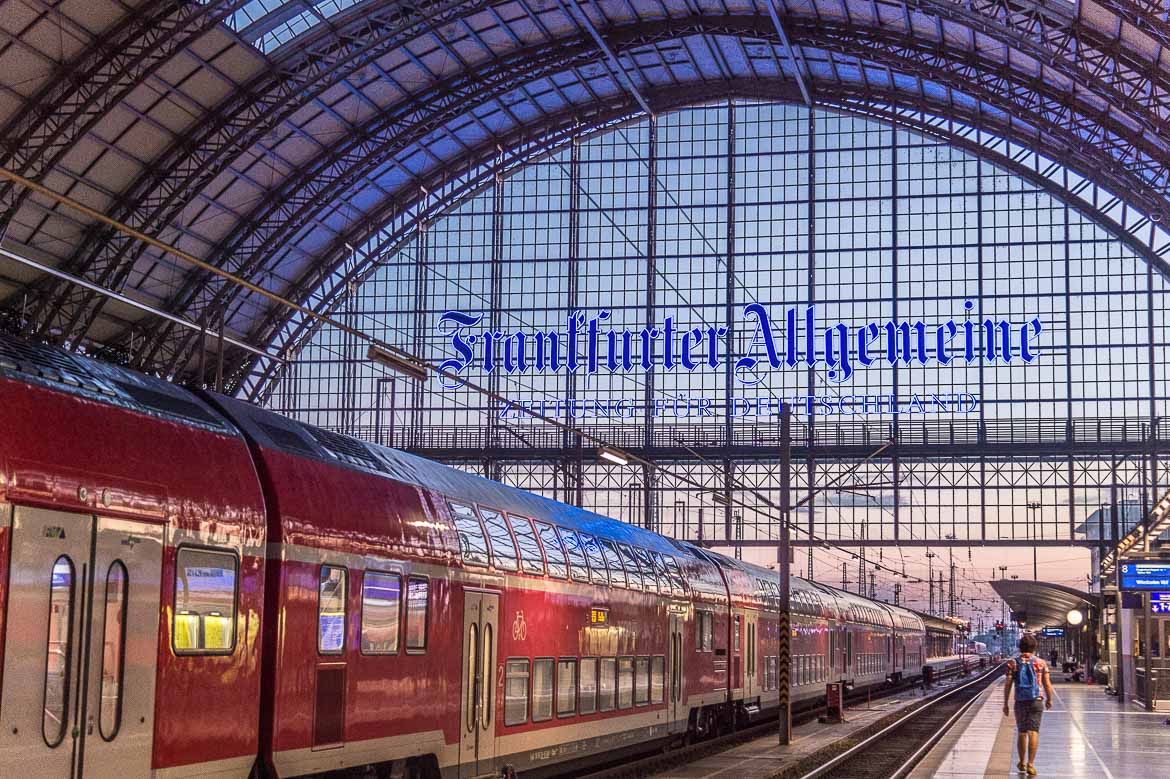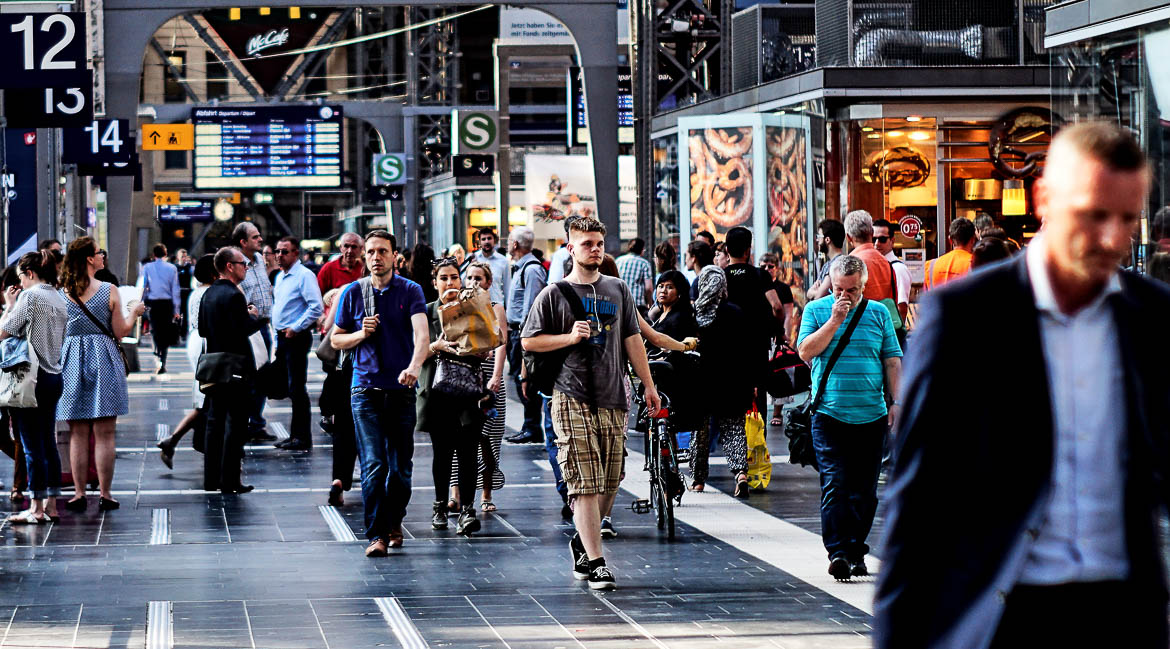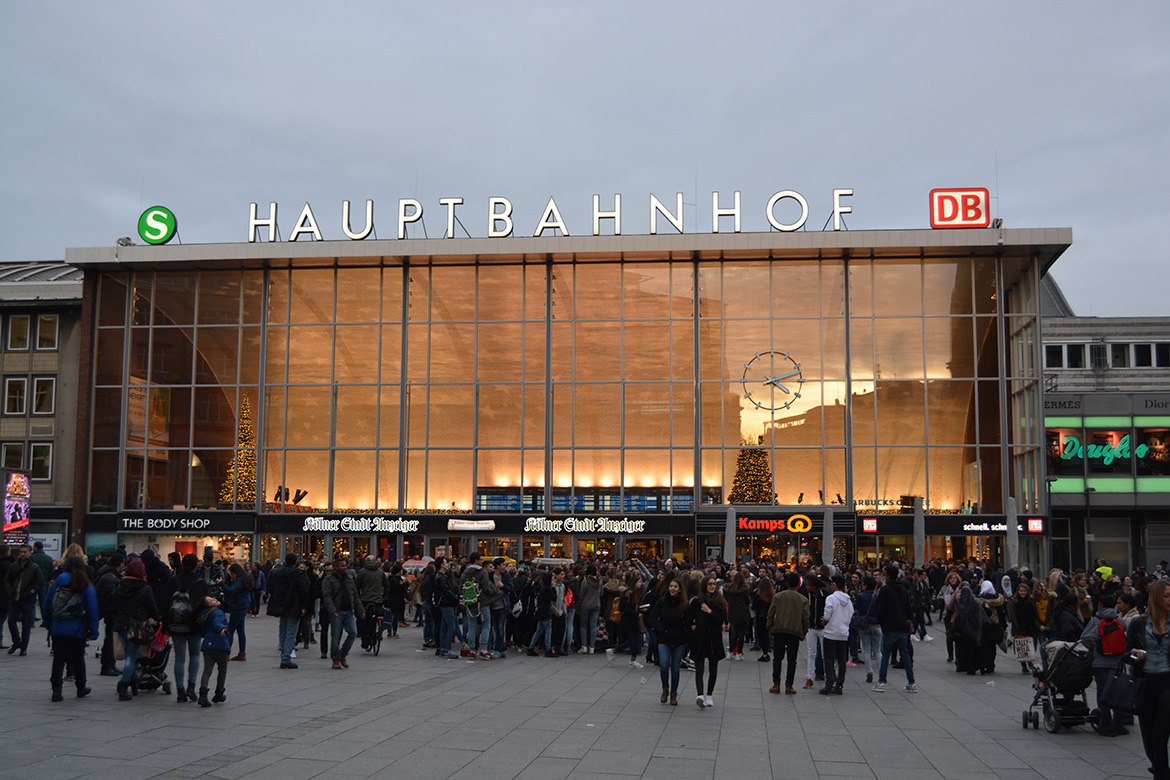Taking trains in Germany is an ideal way to get around the country. Like much of Europe, the train network in Germany is expansive, connecting large cities with small towns providing the opportunity for a variety of experiences. Zipping by various towns and landscapes, trains provide travelers with the opportunity to see more of the country than they would by other means as many rail lines literally transect the countryside. German trains are more modern and more comfortable than many of their European counterparts, and relatively more reliable, though they can be expensive.
Through years of traveling throughout Germany we’ve amassed a few tips to help you make the most of any train travel in Germany. For more in-depth information on train travel in Europe, take a look at our guide.

Tips for Taking Trains in Germany
Ticket Decisions
Point to Point
Point to point tickets are purchased for a specific journey, and are recommended if you’re staying put in one place or taking a few short journeys within the region. You can buy these tickets at the train station the day of travel or book online in advance on the Deutsche Bahn website.
Eurail Pass
Eurail passes are tickets that are good for a certain country or region over a set number of days, providing flexibility in choosing which train to take and where to venture next. A Eurail pass is particularly relevant for travelers who plan on doing a lot of trips throughout a large distance as it can provide a significant discount if you’re planning multiple long trips.
For travelers to Germany, the Eurail pass options an array of options depending on how long you’ll be in the country and if you’re including any additional countries in your travels. If you’re sticking only to Germany than the German rail pass is sufficient, while the Benelux-Germany, Germany-Switzerland, and the Germany-Poland passes allow for extended travel across the borders, but the Eurail Global Pass covers most European train travel and is ideal for those traveling across the continent. FYI: Eurail passes can only be purchased by non-Europeans from Rail Europe, as European citizens can buy Interail passes.
Regional Tickets
Deutsche Bahn offers regional tickets for travelers, which provides a day of unlimited train travel within a certain state. Most cost around 25E for one person but additional travelers can be added for 5E each or so, making it an economical way for a group to get around by train. An added bonus is that most of these tickets also include bus travel within cities and towns too. You can find more information here.
Planning & Booking Tickets
Online Research
Use Deutsche Bahn’s comprehensive website for planning your train travel in Germany, and even throughout Europe. If you are booking your ticket in advance online, you will likely get a better fare than buying the day of. One caveat is that these booking are often under a ‘Saver’ fare so are non-refundable and pertain to a specific train only, while tickets purchased without a discount are flexible and can be used for any train within the same class throughout a certain timeframe. For online tickets you need to provide the ticket collector on board with the ID you used when you booked.
At the station
All German train stations have a DB ticket office and electronic ticketing machines that are easy to use. At the DB offices, you often have to grab a number and wait your turn to speak to an agent. Alternatively, the machines have multiple language options and are pretty straight forward. You can also print off itineraries for your chosen route, which highlights the train platform and transfer details, at the machines to give you clarity on the entire journey.
No Ticket
You are not able to buy tickets on board the trains so you must ensure you have a valid ticket for the one you’re on. Ticket collectors come by like clockwork on ICE and most IC trains, though checks on regional trains aren’t guaranteed. That being said, the fine and embarrassment of not having a ticket when they come by to check is enough to make you never want to test your luck. And you can’t fake ignorance – you won’t get any special break from being a tourist.
Train Type
ICE
These trains are the fastest, most comfortable, and most expensive option for trains in Germany and to surrounding countries. Moving at speeds of up to 300km/hour, ICE trains connect large urban centres and make few stops, resulting in the quickest way to cover long distances. All ICE trains have first and second class seating, and a dining cart.
IC
The Inter-City trains connect travelers to cities throughout a region at speeds up to 185km/hour. The seating is mostly open with rows of two seats on each side, and resembles that of the ICE product. Some IC trains have a dining cart, but it’s not a guarantee. A recent addition to the IC fleet are double decker trains that operate on high volume routes. EC trains are essentially the same as IC, however they make international stops as well.
Regional Trains
There are a few distinct regional train options, which are the slowest but most economical trains in Germany. The IRE connects regional hubs without making a ton of stops in between, the RE is similar but stops at more stations en route, while the RB makes every station stop between two points, connecting smaller towns to the ICE and IC networks.
Reservations
Seat reservations are available on all ICE and IC trains, though they aren’t required. To book a seat, you must reserve at least a few hours in advance, and you can book at the time of purchasing your ticket or even after you’ve already one. Making a reservation is a bit of a gamble; it’s a guaranteed seat but costs up to 10E extra to secure. I’ve reserved a seat on trains that were virtually empty and went without a reservation on others only to be standing in the aisle for hours. Ultimately it depends on your risk tolerance.

Departing
Finding your platform
There will be a large electronic board in all stations that lists upcoming departures and platform numbers. At the track level, you will find a board that displays the next train that will depart on that track, and sometimes shows the next few trains too. When trains are delayed the platforms can change and are announced often only in German so keep an eye on what other travelers are doing around you. When the train comes, you can board immediately without worrying about validating your ticket, unless you have a Eurail Pass and it’s your first day using it.
Getting on the right train
The train network in Germany is a well oiled machine and several trains can come through a single platform in a matter of minutes, stopping only briefly for passengers to get on and off, so be sure you’re getting on the correct train. Often the train will have the final stop listed on it and sometimes a few intermediary stops but often not all of them. Passengers board the train and someone comes around to check tickets once the train is already on its way so if you’re heading in the wrong direction, it can take some time to figure this out. ICE and IC trains often have staff that wait on the platform until the train departs so best to show them your ticket to ensure you’re getting on the right line. When in doubt ask a friendly looking local.
Choosing a seat
At the track level there are train maps for ICE and IC trains showing where the coaches will be relative to the platform so that when the train arrives, you’re waiting in the right spot. This is helpful if you have a reserved seat – the car and seat number will be listed on your reservation ticket – or if you want first dibs at the second class compartments.
If you don’t have a reserved seat, you can walk through the train looking for one that’s unoccupied: ICE and IC trains often have the reservation information displayed above the seats and are for a certain segment so if you’re taking a train from Berlin to Munich and a seat is reserved from Leipzig to Bamberg, it’s yours for the taking before and after those destinations. Also, a classic tourist mistake is accidentally sitting in First Class as it’s typically less busy than second class. Don’t sit in the section labelled with a ‘1’ on the car doors unless you indeed have a first class ticket.
On Board
Food and drinks
While some trains have a dining compartment on board, others do not. The food options on board include snacks like chips and chocolate bars or full meals, as well as alcoholic and nonalcoholic drinks. You can bring your own food and drinks on the trains in Germany and most stations have shops selling snacks, meals, and beverages. First class offers some additional amenities over second class but meal service is not one of them.
Connections
Given the sophistication of the German train system, most train journeys include at least one connection. When you look at your itinerary, you might be stunned to find out that you only have five minutes between trains as most connections are quite short. While this may cause a bit of anxiety, it really doesn’t take too long to move between one platform and another, and common connections are often on platforms located near each other. And if your fears are realized and your train is delayed, you can usually get another soon after. That being said, if you’re connecting to a train that runs infrequently, have major travel plans hinging on your time of arrival, or just want to give yourself more time you can always book a longer stopover. You can do this online on the Deutsche Bahn website or have a ticket agent at the station work out a more conservative itinerary.
Watch your stuff
Taking trains in Germany is completely safe but theft can happen either on the train or at the busy stations, like in the rest of Europe. Keep an eye on your luggage during your journey and make sure anything valuable like your wallet, electronics, cameras, phone, and laptop are with you at all times. While it is rare, it does happen and is one of the best ways to ruin an otherwise perfect trip.

Arriving
Get off at the right stop
This is a common mistake by first timers and can even mess up seasoned travelers. Most major cities have a main station and often smaller suburban ones outside the city centre. Often you’ll hear the name of your final destination and think it’s your stop, when in fact it’s actually a local stop to service the outskirts of the city. For example, the station immediately preceding Köln Hbf (the central station in the middle of town) is Köln Messe/Deutz, which is on the other side of the Rhine River from the centre of town. You can find all of the intermediate stops for your journey on the Deutsche Bahn website so that you’re sure.
If you miss your connection
A missed connection is not the end of the world, though it can feel stressful in the moment. If you have a normal ticket or a Eurail pass, then you can hop on the next train going to your destination. The only restriction is that you have to take a train that is equivalent to or less than the level you purchased. For instance if you bought an ICE ticket then you can take any level of train (ICE, IC, or IRE/RB/RE) to your final stop but if you have a ticket for RB instead, then you can only take a regional train onward.
If you bought a discounted ‘Saver’ fare, which means you have a ticket for a specific train, then you’ll need to get it validated either by the staff on board the delayed train or an agent at the station. They will be able to help you figure out which train to take next.
Local transport
Some train tickets include local transportation to your final destination after arrival. Often these are on ICE trains for journeys over 100 kilometres, and can only be used in one direction. If your ticket includes this it will say +City after your destination and can be used on S-Bahn lines.
Deutsche Bahn Discount Cards
Taking trains in Germany can be expensive, though most locals don’t pay the full fare. For those traveling within Germany for a longer period of time, consider one of Deutsche Bahn’s annual discount cards, which provide either 25%, 50%, or 100% off of the cost of all train tickets purchased within one year. Depending on the one you choose, you pay a lump sum upfront and then get the discount on every single train you take throughout the country. You need to show your card when your ticket is inspected on the train. You need to visit a Deutsche Bahn office to get one and will need a local address as the card is mailed, usually within a week.
For more information on taking trains in Germany, visit Rail Europe.
Photos for A How To Guide On Taking Trains In Germany by JP Bervoets and courtesy of Flickr: Nico, Jim Maurer, and Peter Grossmann. Some of the links in this article are affiliate links, though we always only recommend things we fully endorse.
Make your next trip the best one.
Departful is a full service travel agency creating truly exceptional travel experiences that are 100% personalized to you. Wherever you’re going, whatever your interests, we help you plan the perfect trip.
Lauren
Lauren co-founded Departful in 2012 and is the Managing Director of Departful Media. Since then she has worked between North America and Europe and has published content in partnership with a variety of tourism boards and businesses based around the world. Lauren is currently based in Toronto, Canada.
More travel inspiration from Departful
1 Comment
Add comment Cancel reply
This site uses Akismet to reduce spam. Learn how your comment data is processed.





Hello Lauren!
Great post idea, I really like to travel by train, especially around Czech republic, which means Germany as well. There are so beautiful Bahnhofs in Germany cities, especially the Berlin Hauptbahnhof is really worth to see, but others as well.
Thank you for your article and wish you all the best!
Bye Renata